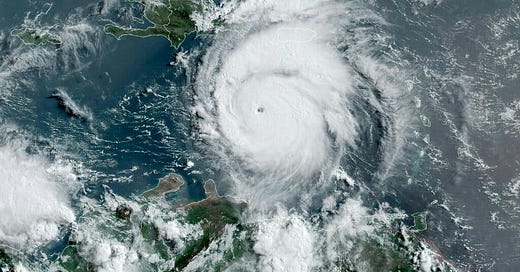Houston Portends the Future
In light of Beryl it‘s a little embarrassing to admit I survived Hurricane Bob, but I did and it gives me an inkling of the quandaries people face in Houston in the wake of two devastating storms.
August 16 1991 started out as a beautiful late summer day in Woods Hole Massachusetts. Runners had just completed the Falmouth Road race and MBL scientists were finishing up their last experiments and packing up their labs to return to their home campuses.
But soon the sky grew as black as night and we huddled in our living room listening to loud thuds as centuries old oak trees crashed to the ground. One giant tree fell at just the right angle so it landed on our neighbors’ house but luckily didn’t break through their roof.
The next day the ground was littered with shredded leaves and the smell of torn green vegetation was overpowering. But everyone was out gawking at the devastation. We saw pasty white scientists who had not ventured outside their labs all summer.
But the following weeks were the most depressing. Everyone had to empty out our freezers and bury our rapidly rotting packages of meat and chicken.
Yellow jackets were mad as hornets. They had lost their homes to the hurricane and they were blaming it on us humans. As soon as you walked out the door they would come fly from two hundred feet away to sting you. My daughter was stung three times and the Falmouth Hospital had the most admissions in its history, all for yellow jacket stings.
But the scene after the storm was the most depressing. All the streets and roads were lined with high walls of dead and fallen trees.
Then, just as people were starting to get their lives back in order we were hit with what Sebastian Junger called “The Perfect Storm,” though we on Cape Cod simply named it the “No-name Storm”.
Once again, we had to empty our freezers and put our lives on hold waiting for our computers and electricity to get back on line.
All over town people were taking stock. Should they buy or sell. Should they give up and get what they could for their devastated homes before retreating to higher ground
I was reminded of my experiences when I read about 300 people dying of heat in Phoenix and 2.1 million people without lights, electricity and air conditioning in three-digit degree temperatures in Houston.
Like us in the wake of Hurricane Bob they had just survived two crippling storms in two months that had left thousands of people without homes or shelter.
This was in the 4th largest city in America, the self- proclaimed energy capital of the world, a city of destroyed houses that their owners will have to sell for whatever they can get. It will be a financial loss that will reverberate through their families for generations to come.
Does Houston portend the future of other cities caught in the coming financial crisis fueled by more intense storms powered by runaway climate change.





